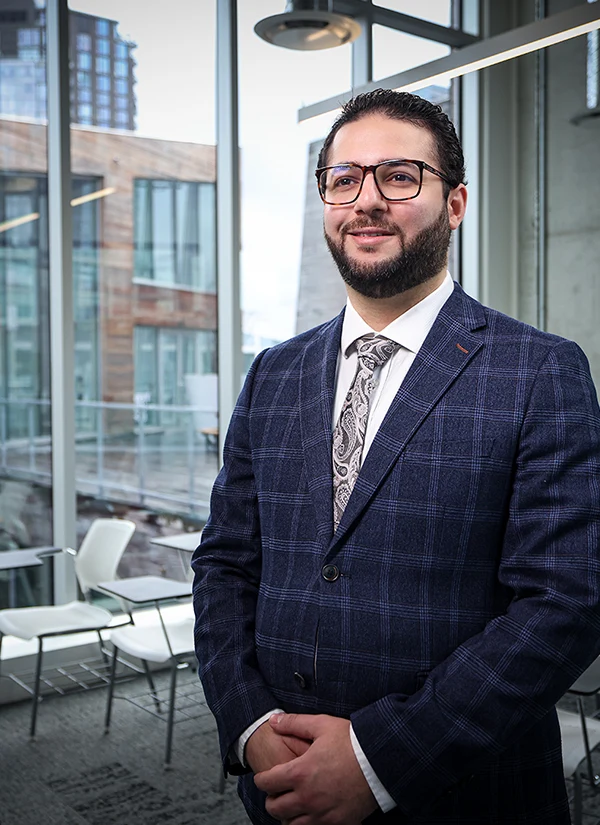
Dr. Rushdi Alsaleh
Assistant Professor, Department of Marketing, Strategy and Entrepreneurship
Artificial intelligence is becoming an increasingly useful tool in the business world and to help students understand its implications, University Canada West has a human guide.
Dr. Rushdi Alsaleh teaches Business Analytics, Machine Learning Tools and Techniques, and Predictive Analytics: What Works? in UCW’s MBA program.
Dr. Alsaleh obtained his PhD in Civil and Environmental Engineering (Transportation Engineering) from the University of British Columbia in 2021. He joined UCW as a sessional faculty member in 2021 and became a full-time professor once he completed his post-doctoral fellowship at UBC.
“There is a huge focus on artificial intelligence and machine learning in different fields to test the ability to automate different tasks,” Dr. Alsaleh says. “It’s interesting how these models can mimic the functionality of the human brain — how humans are thinking, how humans can make decisions, business decisions, and rationalize them.”
Dr. Alsaleh was drawn to artificial intelligence and machine learning in his early university days.
In simple terms, artificial intelligence is a broad field in which computer systems are created that can perform tasks that would normally require human intelligence, such as understanding natural language, recognizing patterns and making decisions. Machine learning is a subset that focuses on creating algorithms that can automatically learn from data and make predictions or decisions without being explicitly programmed.
“I was interested in this field looking at other researchers around the world, like what they are doing with artificial intelligence and the capability of this artificial intelligence,” he says. “I was dreaming of how to integrate and develop artificial intelligence systems and integrate them into the business world to make better decisions to integrate them. So that was fascinating me.”
He has written or co-written more than 20 papers, many of which focus on artificial intelligence and transportation. Has consulted with the Ministry of Highway and Transportation and the cities of Vancouver, Kamloops and Edmonton, among others.
However, the implications of artificial intelligence and machine learning go beyond traffic and open interesting roads to the future in all sorts of disciplines, including business.
“These recent advances have enabled us to analyze big data more efficiently. We can analyze customers’ behaviours based on their shopping habits, purchasing history, biometrics and even base data on conversations between marketing staff and shoppers to gain important insights about the customer.”
Dr. Alsaleh was attracted to working at UCW by “the great, positive culture” at the University.
“UCW gives you the opportunity to grow, to conduct research and provides the funds and facilities to support research and teaching,” he says. “It’s a fast-growing university, which I love. You feel the energy of researchers, educators, professors – an energetic feeling to produce and contribute to the community of the University and Vancouver and the surrounding area.”
While teaching, Dr. Alsaleh continues to do research. Current projects include looking at teaching methodologies and how businesses perform in highly competitive markets. Such research is highly collaborative in nature and links Dr. Alsaleh with colleagues from around the world.
“We are collaborating with other researchers that have different expertise. It is great in that we are sharing the knowledge together in order to produce high-quality research.”
At UCW, Dr. Alsaleh is also a member of the Senate (formerly Academic Council) and is Vice-Chair of the Research and Scholarly Activities Committee.
“I like that UCW is a student-focused university,” he says. “I love to share my knowledge and my experience with the next generation of students and seeing them succeed in the future, whether in their career or future education.”





